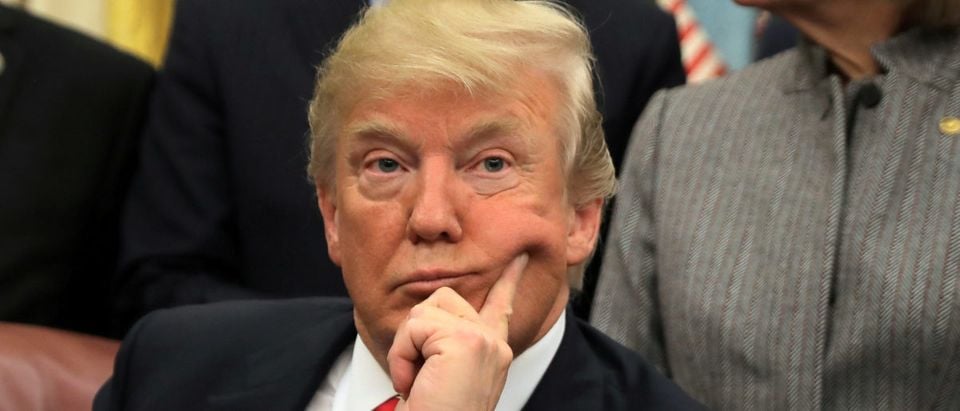The New York Times wants to make it official: President Donald Trump is a racist.
On Friday, the editorial board of America’s most influential paper asserted there was no doubt of that.
The editorial was in response to Trump reportedly asking why America takes in so many immigrants from “shithole” countries instead of places like Norway. “Where to begin?” the Times’ editorial board collectively sighed when reflecting on Trump’s statement. “How about with a simple observation: The president of the United States is a racist.”
It’s not a rare occurrence for liberal pundits to call the president of the United States a racist, but it is certainly an event to see The New York Times make it their editorial stance that Trump is a certified bigot.
And the paper only doubled down on its claim against Trump in the ensuing days.
On Sunday, Times columnist Charles Blow added his own opinion on Trump’s bigotry in an op-ed with the unsubtle title, “Trump Is a Racist. Period.”
On Monday, the paper of record published in its opinion section “Donald Trump’s Racism: The Definitive List,” a lengthy article that cataloged all of the president’s alleged acts of prejudice throughout his long life. From the business practices in his early days doing real estate to his comments on immigration during the 2016 campaign, The Times’ article tried to definitively argue Trump was a racist.
It’s a big deal that an institution like the Times is so intent on classifying the president as a racist. For past presidents, this would have marked the biggest crisis of their tenure. The lowest point of George W. Bush’s presidency, according to the man himself, was when rapper Kanye West claimed he didn’t care about black people.
And that was just Kanye West going off script on live TV, a remark with far less weight than what the editorial board of The New York Times said about Trump. Yet Bush, the president who witnessed 9/11 and led America into the catastrophe that was the Iraq war, thought one rapper calling him a racist was still his low point.
That’s the devastating power of a racism charge. For years, no other accusation outside of pedophilia has been more damning than that. A person’s reputation could forever be ruined by just one accusation, with all the employment woes and social opprobrium that accompany it.
“I was raised not to call people racist on the theory that it was hard for them to be rehabilitated once you said that,” Democratic Colorado Sen. Michael Bennett said on Sunday’s “Meet The Press” on whether Trump’s “shithole” comments made him a racist. That one sentence is a good summary given to the power of calling someone a racist. (Bennett didn’t designate Trump a racist, but he did say his comments were bigoted.)
It shouldn’t be doubted that folks like Charles Blow and others in the media genuinely believe Trump is a racist for saying “shithole” countries and criticizing illegal immigrants in colorful language. But they aren’t just saying what they believe to get it off their chest.
The commentators wanting Trump to be certified as a racist understand the power of that charge and how it has played out in politics in the past. It’s a potent political weapon that undermines the appeal of the target and raises the stakes for his supporters. Not only does the accused figure stand as a racist in the public eye, so does anyone who supports him.
The apparent hope of many in the media is that if enough people call Trump a racist, his “fascist” regime will come tumbling down and everyone who ever voted or worked for him will be disgraced forever.
Others are a little more practical in calling Trump and Republicans racist in that it furthers their immediate political goals.
Democratic Illinois Sen. Dick Durbin on Monday offered the president and his party a chance for redemption from liberals calling them racist by signing on to a “clean” amnesty bill for illegal aliens who came to the U.S. as minors. Trump and Republicans wouldn’t get anything in return for giving citizenship to tens of thousands of future Democrat voters, but they would at least get the chance to not look “racist” to their political enemies…
There is, however, a major problem with liberals deploying the racism charge against Trump and his supporters: their targets seem unfazed by it. Trump, for instance, responded to the charges with this exaggerated statement, “I’m the least racist person you will ever interview.”
Trump’s supporters aren’t buying the media line that he is a racist and appear to see it as a cynical political tool to benefit the Democrats. If they watched Durbin’s Monday comments, they would have a good reason to believe that.
Rather than undermining Trump, the charges from the media are deflating the power of calling someone a racist. Americans aren’t coming to view the reluctance towards letting in more third world immigrants as a racist view. Instead, they begin to doubt the veracity of racism accusations and become more immune to facing those charges themselves.
If it’s somehow “racist” to want secure borders and reduced immigration, these Trump supporters are far more likely to say “so be it” then change their views on the subject.
The power of a racism charge has been in decline throughout the Trump era, and the latest push to brand the president will only reinforce the term’s further decline in seriousness. If the president of the United States is a racist for questioning mass immigration from the third world, fewer Americans are going to accept the media’s labeling of supposed racists.
Considering the often reckless deployment of the term by the Left for political gain, that development is mostly a good thing.
It at least means Republicans aren’t going to immediately surrender on amnesty just so Democrats will stop calling them racist.
Follow Scott on Twitter and buy his new book, “No Campus for White Men.”


